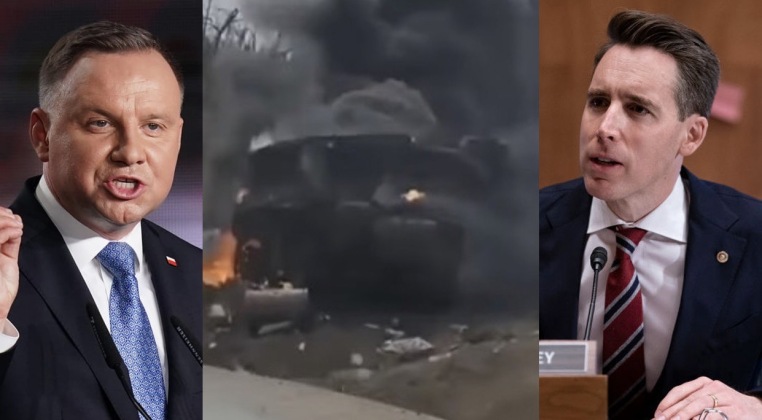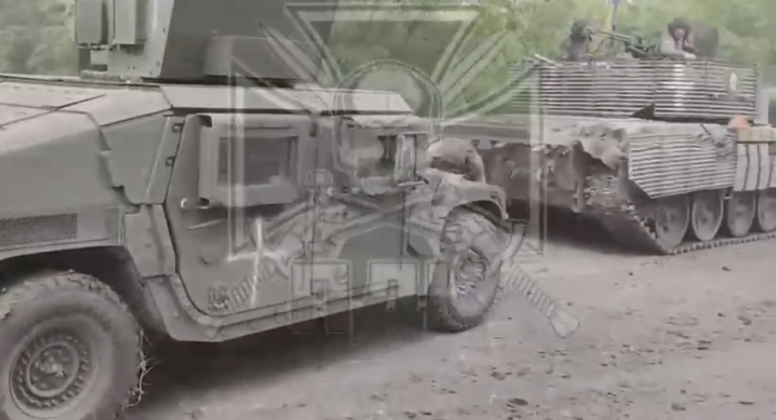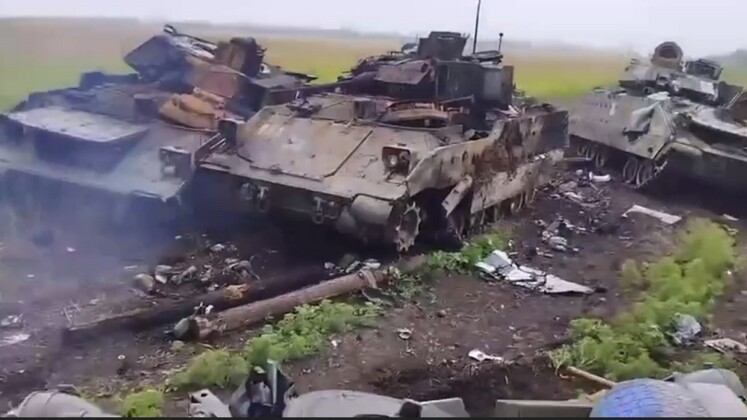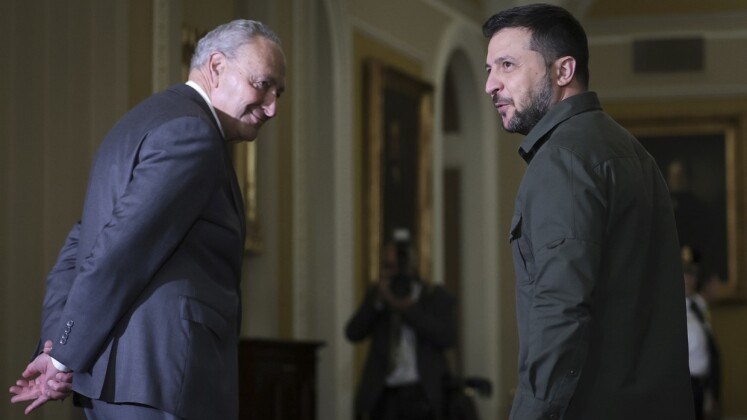Military Watch:
Has the West Reached a Turning Point in Support For Ukraine? Failed Summer Offensive Raises Controversy

Polish President Andrzej Duda, U.S. Senator Josh Hawley and Destroyed Challenger 2 Tank
Beginning years before the escalation of the Russian-Ukrainian conflict into a full scale war in early 2022, the post-2014 Western-aligned leadership in Kiev has received very considerable support from across the NATO alliance to bolster its position military and economically. This ranged from laying the ground work for joint operations between Ukrainian units and Western special forces, to familiarising Ukrainian forces with use of Western military hardware including NATO members’ vast satellite networks, which played a key role in facilitating successful joint operations between Ukraine and its foreign supporters.
Beginning years before the escalation of the Russian-Ukrainian conflict into a full scale war in early 2022, the post-2014 Western-aligned leadership in Kiev has received very considerable support from across the NATO alliance to bolster its position military and economically. This ranged from laying the ground work for joint operations between Ukrainian units and Western special forces, to familiarising Ukrainian forces with use of Western military hardware including NATO members’ vast satellite networks, which played a key role in facilitating successful joint operations between Ukraine and its foreign supporters.
Support escalated very considerably from February 2022, ranging from deployments of Western special forces and other combat units to the frontlines, a notable example being the British Royal Marines dispatched for combat operations, to establishment of a massive network of Western personnel organising the war effort from logistics to tactics - all supplemented by aid in the hundreds of billions of dollars.
Contractors and volunteer units from across the Western world have also played major roles in the war effort, from Polish mercenary units thousands strong fighting on the frontlines to the multinational volunteer units such as the Georgian Legion.


Polish Volunteer Corps Armoured Vehicles During Assault into Russian Territory
While the West has invested tremendously in supporting the Ukrainian war effort, September has seen growing signs emerge of a possible turning point in this support following increasingly pessimistic assessments of Ukraine’s long awaited offensives against Russian positions.
While the West has invested tremendously in supporting the Ukrainian war effort, September has seen growing signs emerge of a possible turning point in this support following increasingly pessimistic assessments of Ukraine’s long awaited offensives against Russian positions.
Both Russian and Ukrainian sources indicate that losses in the offensives which began in early June have been extreme, with personnel losses estimated at over 70,000 Ukrainians while battlefield gains continue to appear negligible.
The cost of supporting the Ukrainian war effort was long expected to become a controversial issue should the long awaited offensives fail to gain tangible results, with a growing consensus regarding their failures fuelling calls to reevaluate policy and shift resources elsewhere - namely to preparing for conflict in the Pacific.
Although President Volodymyr Zelensky has indicated that his country would “do everything not to stop [the offensive] during difficult days in autumn with poor weather and in winter,” the viability of this has increasingly been called into question.
Officials in Washington have increasingly suggested that offensives are unlikely to achieve their goals, with the New York Times citing officials referring to Ukrainian forces as “exhausted by the summer fighting.” This, they said, would force the Army to reduce pressure on the frontlines to rebuild stockpile and rest within a few weeks at most.
With Ukrainian forces, in particular critical assets such as air defences, becoming increasingly depleted, it remains uncertain whether its Western supporters will continue to back what increasingly appears to be an unwinnable war effort, or whether Kiev will be cut off and pressed to make terms at an earlier stage.


Destroyed American Bradley Fighting Vehicles During Ukrainian Offensive
On September 21 U.S. Senator Josh Hawley joined growing numbers to observe that for all the hundreds of billions of dollars in support Ukraine received, it had “nothing to show for it.” “If there’s some path to victory in Ukraine, I didn’t hear it today. And I also heard that there’s going to be no end to the funding requests… What we were basically told is ‘Buckle up and get out your checkbook’,” he stated. “It’s American people’s money. They’ve spent $115 billion, and, so far, they have basically nothing to show for it,” he added.
On September 21 U.S. Senator Josh Hawley joined growing numbers to observe that for all the hundreds of billions of dollars in support Ukraine received, it had “nothing to show for it.” “If there’s some path to victory in Ukraine, I didn’t hear it today. And I also heard that there’s going to be no end to the funding requests… What we were basically told is ‘Buckle up and get out your checkbook’,” he stated. “It’s American people’s money. They’ve spent $115 billion, and, so far, they have basically nothing to show for it,” he added.
Hawley called for an audit of the funds already sent to Kiev, and stressed that funding for the war effort should be cut off immediately. With the American economy having yet to recover from the COVID-19 crisis, the massive allocations of funding for Ukraine has only been seen as more controversial.
Hawley’s statement closely coincided with a report from U.S. Senate Majority Leader Chuck Schumer that President Zelensky had warned his country faced prospects of losing the war should American support prove insufficient. A group of over two dozen senators and representatives sent a letter to the White House on September 21 expressing concerns about the allocation of funds and calling for further clarification on the status of Ukraine’s recent offensives. Their letter argued” “the American people deserve to know what their money has gone to. How is the counteroffensive going?”


Chuck Schumer and Volodymyr Zelensky
While the United States had from the outset been more measured in its support for the Ukrainian war effort than many of its European partners, signs that European states could similarly be considering reducing their support for the war effort have further highlighted the extent that war fatigue is affecting the Western world more broadly.
While the United States had from the outset been more measured in its support for the Ukrainian war effort than many of its European partners, signs that European states could similarly be considering reducing their support for the war effort have further highlighted the extent that war fatigue is affecting the Western world more broadly.
Europe has arguably to a much greater extent that Russia suffered most from the fallout of the war, with a loss of access to both cheap Russian fossil fuels and to Russian markets being a major blow to the continent’s leading economies.
While Europe’s largest economy Germany has shown few signs of changing course, President Andrzej Duda on September 22 stated that his country would no longer send modern armaments to Ukraine, amid growing tensions between the two states.
Polish Deputy Foreign Minister Arkadiusz Mularczyk that day called for “the participation of the United States” to “cool down hot Ukrainian heads,” claiming that the Ukrainian government was “behaving absolutely unfairly towards Poland.” A primary cause for concern was Kiev’s opening of legal proceedings against Warsaw over its refusal to lift restrictions on Ukrainian grain imports.
Poland had from the outset of the war been one of the most hardline and outspoken supporters of the Ukrainian war effort alongside Britain and the Baltic states, which made its shift particularly notable.
Polish concerns were voiced by Foreign Minister Zbigniew Rau, who claimed that “of all the allies, Poles took upon themselves the heaviest burden when it came to helping Ukraine,” with Kiev responding by acting like “dishonest grain traders” to force Warsaw to “pay the bill for helping Ukraine twice.” A lasting shift in Poland could see other similarly hardline European states similarly revise their positions.
Nothing to show for it ?
ReplyDeleteUkraine has destroyed the bulk of the Russian army that carried out the invasion of Ukraine in February - April 2022. they are either fertilizer, or lying in a hospita bed or not in any condition to come back to war.
Ukraine has ensure the US Army and NATO armies will not have to face a strong Russian Army for at least the next 10-20 years,mall for the loss of Zero US or NATO servicemen.
The problem is VERY Few US Congressmen have any military experience, and they think military campaigns can follow the 24 hour news cycle.
And a small but vocal Republican fringe is actually proRussian.
Wakakakaka…
Delete"Ukraine has destroyed the bulk of the Russian army that carried out the invasion of Ukraine"
What r Ukraine/ masquerading NATO armies r been decimated now with?
Yr foul gaseous!
"for the loss of Zero US or NATO servicemen"
Yaloh, in yr syiok-sendiri wet dream. Don't wake up! The coming days would be nightmares for a know-nothing cum military fart.
This article written by the Kremlin Editorial Staff.
ReplyDeleteWith yr unbroken demoNcratic commentaries!
Delete